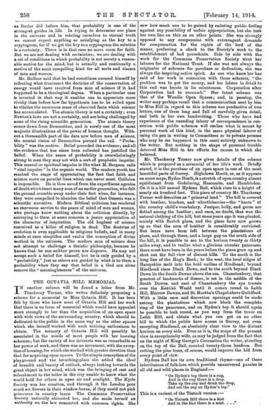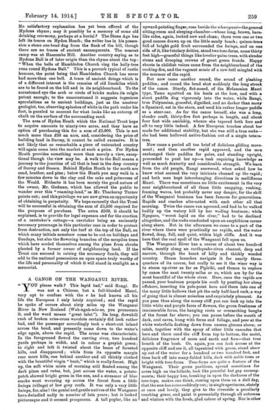THE OCTAVIA HILL MEMORIAL
IN another column will be found a letter from Mr. Thackeray Turner, who writes definitely proposing a scheme for a memorial to Miss Octavia Hill It has been felt by those who knew most of Octavia Hill and her work that there is no form of memorial which would have appealed more strongly to her than the acquisition of an open space with wide views of the surrounding country, which should be dedicated to the public in the same way as the other spaces which she herself worked with such untiring enthusiasm to obtain. The memory of Octavia Hill will possibly be associated in the minds of most people with her housing schemes ; but the variety of her interests was as remarkable as her power of work, and there was no movement, with the excep- tion of housing, for which she worked with greater devotion than that for acquiring open spaces. To the simple conception of the playground and the breathing-place she added the ideal of breadth and beauty of outlook, always looking towards the great object in her mind, which was the bringing of rest and refreshment to the toiler in the city unable to know what the world held for others in open air and sunlight. The Hyde Society was her creation, and through it the London poor could set flowers in their window-boxes, if they could not pick primroses in country lanes. The Commons Preservation Society naturally attracted her, and she made herself an authority on the law connected with common rights. She
saw how much was to be gained by enlisting public feeling against any possibility of unfair appropriation, but she took her own line on this as on other points. She was strongly opposed to any compromise with extravagant demands for compensation for the rights of the lord of the manor, preferring a check to the Society's work to the establishment of bad precedents. Side by side with the work for the Commons Preservation Society went her labours for the National Trust. If she was not always the originator of schemes for purchase or dedication, she was always the inspiring active spirit. As one who knew her has said of her work in connexion with these schemes, "the problem was to get the money, and her labour in detail to this end was heroin in its minuteness. Corporation after Corporation had to succumb." Her latest scheme was that of the Wandle Open Spaces; and, in passing, the writer may perhaps recall that a communication sent by hint to Miss Hill in regard to this scheme was productive of two letters, one of them long and full of carefully given detail, and both in her own handwriting. Those who have had experience of the unending labour of correspondence in con- nexion with public schemes will realise what is meant by personal work of this kind, in the mere physical labour of using the pen in writing to Committees or to private persons who may be (as happened in this case) entirely unknown to the writer. But nothing in the shape of personal trouble deterred Miss Hill in her efforts fore causes in which she believed.
Mr. Thackeray Turner now gives details of the scheme which is proposed as a memorial of her life's work. Briefly stated, it is the purchase of an open space in one of the most beautiful parts of Surrey. Highdown Heath, or, as it appears on some maps,HydonHeath,it astretch of open country almost equidistant from Godahning, Hascombe, and Hambledon. On it is a bill named Hyaena Ball, which rises to a height of nearly six hundred feet. This piece of country Mr. Thackeray Turner well describes as " primeval land." The bill is covered with heather, bracken, and whortleberries—the " hurts " of the country child's vocabulary. Juniper, holly, and gorse are dotted among the heather ; and once, no doubt, that was the natural clothing of the hill, but some years ago it was planted, mainly with Scotch pines, and the pines have now grown up so that the area of heather is considerably restricted. But lanes have been left between the plantations of pines, and through these, and a large gap on the south side of the hill, it is possible to see to the horizon twenty or thirty miles away, and to realize what a glorious circular panorama there must have been in the years before the pines grew up and shut out the full view of distant bile. To the north is the long line of the Hog's Back; to the west, the level ridges of Hampshire melt into the bold outline of Hindhead ; beyond llindhead rises Black Down, and to the south beyond Black Down lie the South Downs above the sea. Chanctonbury, that greatest of landmarks of Sussex, ie set in the middle of the South Downs, and east of Chazictonbury the eye travels over the Kentish Weald until it comes round to Leith Hill, Merrow Downs, and St. Martha's Chapel above Guildford. With a little care and discretion openings could be made among the plantations which now block the complete ring of the panorama, and on Hydon's top it should again be possible to look mind, as you may from the tower on Leith Hill, and obtain what you can get on no other hill to which the public have access in Surrey, not even excepting Hindhead, an absolutely clear view to the distant horizon on every side. Even as it is, the scope of the present view is exceptionally wide, ae may be judged from the fact that on the night of King George's Coronation the writer, standing on the top of the Ball, counted twenty-three bonfire's. But cutting the pine trees, of course, would improve the hill from every point of view.
Hydons Ball has its own traditional rhyme—one of those inheritances of folk-lore which provide unanswered puzzles in all old and wild places in England:— "On Hydon's top there is a cup, And in the cup there is a drop. Take up the cup and drink the drop, And set the oup on Hydon's top."
This is a variant of the Tintock version :— " On Tintock Hill there is a kilt And in the Ida there is a mist. . ." No satisfactory explanation has yet been offered of the Hydons rhyme ; may it possibly be a memory of some old drinking ceremony, perhaps at a burial P The Stone Age has left its traces on Hydon Heath; the writer has in his posses- sion a stone axe-head dug from the flank of the hill, though there are no traces of ancient encampments. The nearest camp was at Hascombe HilL Another country saying as to Hydons Ball is of later origin than the rhyme about the top: " When the belle of Hambledon Church ring the holly-tree runs round Hydons Ball." This is a proverb typical of rustic humour, the point being that Hambledon Church has never bad more than one belL A trace of ancient doings which is of a different interest is the remains of old Ihnekilns which are to be found on the hill and in its neighbourhood. To the accustomed eye the arch or oirole of bricks makes its origin patent enough; to the unaccustomed it suggests ingenious speculations as to ancient buildings, just as the amateur geologist, too, observing splashes of white in the path under his foot, is puzzled to account for what looks like an outcrop of chalk on the surface of the surrounding sand.
The area of Hydon Heath which the National Trust hope to acquire amounts to ninety-two acres, and they have an option of purchasing this for a sum of 25,000. This is not much more than £50 an acre, and, considering the price of building land in Surrey, it cannot be called excessive. It is not likely that so remarkable a piece of untouched country will again come into the market at such a price. For Hydon Heath provides something more than merely a view, excep- tional though the view may be. A walk to the Ball means a journey to the junction of all that is best in the deep country of Surrey and Sussex. Behind Hydon Heath to the north are sand, heather, and pine; below the Heath you may walk in a few minutes down to the clay and the oaks and primroses of the Weald. Hitherto it has been merely the good nature of the owner, Mr. Godman, which has allowed the publics to wander over this " roaming-land," as Mr. Thackeray Turner points oat; and this privilege we are now given an opportunity of obtaining in perpetuity. We hope earnestly that the Trust will be successful in obtaining the sum of £5,500 required for the purposes of purchase. The extra 2500, it should be explained, is to provide for legal expenses and for the erection of a caretaker's cottage—a caretaker being an eminently necessary personage in this particular case in order to protect from destruction, not only the turf at the top of the Ball, on which many initials somehow come to be cut on holidays and Sundays, but also the flowering branches of the mespilus trees which have seeded themselves among the pines from shrubs planted by a former owner of neighbouring land. If the Trust can succeed in raising the necessary funds, they will add to the national possessions an open space truly worthy of the life and personality of which it will stand in sunlight aa a memorial.







































 Previous page
Previous page